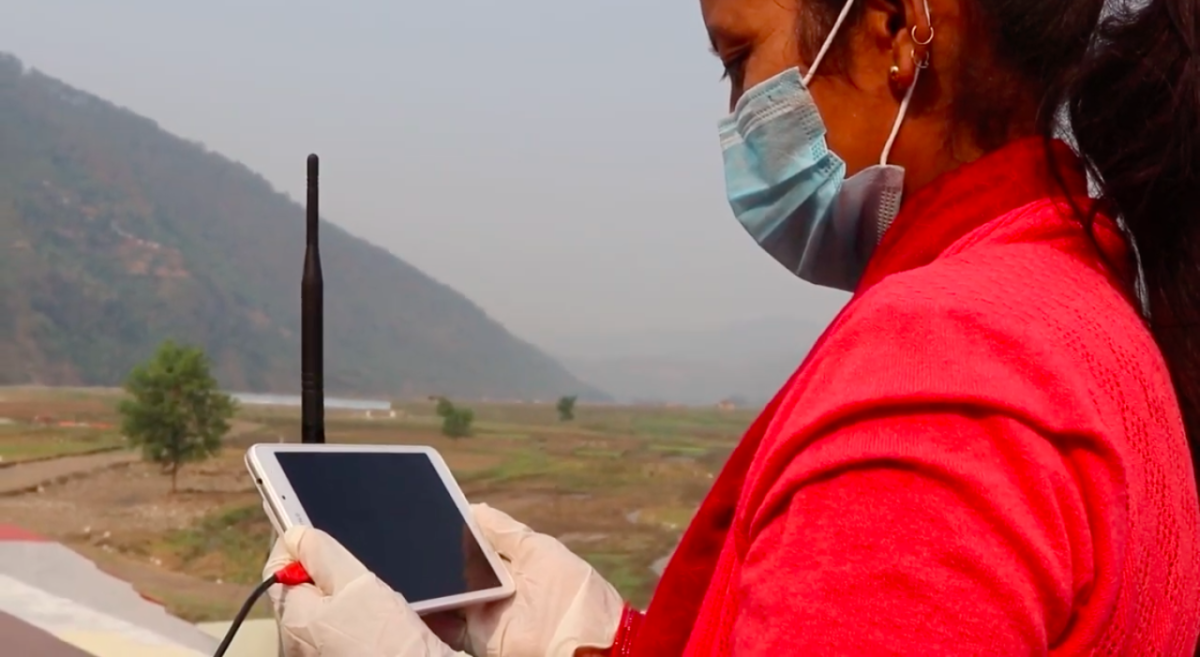
Teaming up with Pfizer on New Cargo Drone Project
January 12th, 2021

We're happy to announce that Pfizer has contracted us to lead a new cargo drone project. Our previous partnership with Pfizer focused on engineering a cargo drone add-on to convert DJI's highly reliable M600 industrial data collection drone into a cargo drone. As part of this earlier project, our partners at Dominican Republic Flying Labs used the repurposed M600 drone to deliver essential medicines to remote health facilities (video below). The purpose of these deliveries was to demonstrate the value-add of locally-led delivery drone projects that use affordable and locally repairable cargo drones. The M600 cargo drone add-on has since been used very successfully by Nepal Flying Labs to collect patient samples. We've also sent the add-on to Philippines Flying Labs and look forward to seeing their first cargo drone projects. The M600 cargo drone add-on is available here, and the full report on the Dominican Republic project is here.
Pfizer is contracting us to engineer a new cargo drone add-on specifically for the M300, DJI's latest and most reliable industrial drone yet. While the M600 will continue to serve Flying Labs' needs, the M300 comes with additional advantages. DJI's newest industrial drone can handle even the harshest weather conditions. The platform also has multiple dedicated sensors for collision avoidance, making it extremely safe for both ground and air risks. What's more, the M300 has double the range of the M600. We expect the M300 to have a range closer to 25km compared to the M600's 10km range. We expect the M300's payload capacity to be around 1.5kg.
Our new project with Pfizer comes at an especially important time. Vaccines for COVID-19 need to be distributed at scale, and they need to reach the most remote communities in the Majority World.
While we've successfully engineered, tested, and deployed the M600 cargo drone on three continents, doing so for the M300 will come with its own set of challenges, so we want to manage expectations. That said, we have every intention to succeed and have already learned heaps with the M600 cargo drone. So our highly experienced engineering team is extremely keen to get started.
We've been involved in multiple cargo drone projects across multiple countries and continents since 2016 (more on this below). Two challenges that have remained constant throughout this time is usability and affordability (or lack thereof) of cargo drones for shorter range deliveries, i.e., under 25 kilometers. This lack of usability (ease of use) and affordability has prevented dozens of projects from taking off across the Flying Labs network. This explains why the vast majority of our cargo drone projects to date have used unconventional delivery drones, i.e., data collection drones that we have repurposed into cargo drones. Despite the challenges that do come with repurposing, doing so still goes a long way to keeping complexity and costs low while also enabling operators to use the same easy-to-use drone for data collection and delivery, thus increasing the services they can offer with the same drone. As such, instead of trying to build the full drone stack for delivery, we've decided to focus on building one layer, a versatile cargo drone add-on designed to work with existing industrial drones. And while the M300 costs more than the M600's, the M300 remains more affordable than most commercially available cargo drones. And the M300 is backed by a $15 billion-dollar company, which means we can expect the M300 to still be around in 5 years, just like the M600 has.
Our strong interest in the M300 cargo drone does not mean this drone will serve all delivery needs. No drone does. As such, we're certainly not in competition with the leading cargo drone companies in this space. We couldn't possibly compete, even if we wanted to. We're an NGO, not a for-profit company, after all. And we're focusing on short-range deliveries to strengthen long-term local expertise in drone delivery, whereas the drone delivery industry's leading players are designing their drones for 60km-300km range deliveries.
Last but not least, our key focus is on Flying Labs. The vast majority of the 30+ Flying Labs around the world are keen to use delivery drones for public health and other social good opportunities. Enabling them to have access to M300 cargo drones will go a long way to democratizing cargo drone technology, enabling local experts to drive the application of cargo drone technology themselves, such as delivering the life-saving vaccines to rural communities.
WeRobotics and Flying Labs have been involved in medical cargo drone projects since 2016:
Together, we've delivered medicines and blood samples in the Amazon Rainforest with BD; Delivered essential medicines to remote clinics in the Dominican Republic with Pfizer; Collected TB samples from remote clinics in Nepal with BNMT; Ran cargo drone trainings & demos with the Center for Disease Control (CDC) in Papua New Guinea. With each of these efforts we focused explicitly on strengthening long-term local expertise and capacity in drone delivery, and we fully transferred appropriate drone technology to local experts across Flying Labs. In addition, we're working with the World Health Organization (WHO) on cargo drone projects in Ghana Flying and Madagascar to optimize the collection of patient samples. The purpose is to enable WHO to make direct and efficient use of existing drone delivery networks. We were also contracted to work on the first phases of a vaccine drone delivery in the DRC. Furthermore, we've worked on non-traditional cargo drone projects with partners in Brazil to reduce Zika, in Fiji to reduce Dengue and in Tanzania to reduce malaria. In addition, we offer a comprehensive, fully peer-reviewed professional online course on the use of cargo drones for medical delivery. Participants who complete this unique course receive a certificate signed by Direct Relief, MIT, the University of Pennsylvania, and WeRobotics.
Recent Articles

